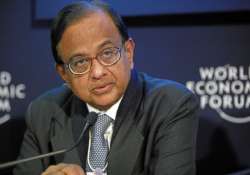FM to leave tomorrow for IMF-World Bank meet in Washington
New Delhi: Finance Minister P Chidambaram will leave for the US tomorrow to attend the annual meeting of the IMF and the World Bank, during which world leaders will deliberate on prevailing uncertainty in global

New Delhi: Finance Minister P Chidambaram will leave for the US tomorrow to attend the annual meeting of the IMF and the World Bank, during which world leaders will deliberate on prevailing uncertainty in global economy.
Discussions will also focus on the much-awaited quota reforms that will benefit emerging economies including India.
Chidambaram is slated to return on October 16. Reserve Bank Governor Raghuram Rajan and Economic Affairs Secretary Arvind Mayaram, among others, will also be attending the annual meetings.
The main meetings are scheduled from October 11-13, 2013 in Washington, while other events will start from October 8.
Sources said Chidambaram will meet US Treasury Secretary Jacob Lew on October 13.
The Finance Minister will, among other things, pitch for more overseas investments into India, which is facing tough economic conditions. India's economic growth fell to a decade low of 5 per cent in 2012-13 fiscal. In the April-June quarter of the current fiscal, it has expanded by only 4.4 per cent.
In a bid to woo foreign investments, Chidambaram will meet Foreign Institutional Investors (FIIs) and hedge fund managers in San Fransisco on October 14, sources said.
As per latest data, FIIs have invested USD 7 billion in the Indian equity and debt markets so far in 2013.
The visit comes against the backdrop of external sector pressure with the country's foreign exchange reserves dipping by over USD 15 billion since March, 2013 to USD 276 billion as on September 27.
Foreign Direct Investment (FDI) into India rose by 12 per cent, year-on-year, to USD 1.65 billion in July. In the same month of last year, the country had received FDI worth USD 1.47 billion.
Reforms for increasing voting shares of emerging markets, including India, are also on the agenda of the global leaders.
India currently has a voting share of 2.44 per cent in the Washington-based IMF. US has the highest voting share of 17.69 per cent.
Some of the other key issues expected to be discussed at the IMF-World Bank meeting include world economic outlook, euro-zone crisis, poverty eradication, economic development and making aid providing efforts effective.
Meanwhile, the US - world's largest economy - is grappling with government shutdown amid political slugfest, raising concerns over the possibility of the country defaulting on its debt obligations.
In other parts of the world too, including India, China and many European nations, economic situation remains uncertain. Emerging markets are also gearing up to tackle the situation that will arise after the US Federal Reserve starts tapering its easy money regime.
Earlier this year, IMF lowered the global growth forecast for 2013 to 3.1 per cent, from the earlier 3.3 per cent.
For 2014 also, the multilateral agency has slashed growth forecast to 3.8 per cent, from 4 per cent.
Discussions will also focus on the much-awaited quota reforms that will benefit emerging economies including India.
Chidambaram is slated to return on October 16. Reserve Bank Governor Raghuram Rajan and Economic Affairs Secretary Arvind Mayaram, among others, will also be attending the annual meetings.
The main meetings are scheduled from October 11-13, 2013 in Washington, while other events will start from October 8.
Sources said Chidambaram will meet US Treasury Secretary Jacob Lew on October 13.
The Finance Minister will, among other things, pitch for more overseas investments into India, which is facing tough economic conditions. India's economic growth fell to a decade low of 5 per cent in 2012-13 fiscal. In the April-June quarter of the current fiscal, it has expanded by only 4.4 per cent.
In a bid to woo foreign investments, Chidambaram will meet Foreign Institutional Investors (FIIs) and hedge fund managers in San Fransisco on October 14, sources said.
As per latest data, FIIs have invested USD 7 billion in the Indian equity and debt markets so far in 2013.
The visit comes against the backdrop of external sector pressure with the country's foreign exchange reserves dipping by over USD 15 billion since March, 2013 to USD 276 billion as on September 27.
Foreign Direct Investment (FDI) into India rose by 12 per cent, year-on-year, to USD 1.65 billion in July. In the same month of last year, the country had received FDI worth USD 1.47 billion.
Reforms for increasing voting shares of emerging markets, including India, are also on the agenda of the global leaders.
India currently has a voting share of 2.44 per cent in the Washington-based IMF. US has the highest voting share of 17.69 per cent.
Some of the other key issues expected to be discussed at the IMF-World Bank meeting include world economic outlook, euro-zone crisis, poverty eradication, economic development and making aid providing efforts effective.
Meanwhile, the US - world's largest economy - is grappling with government shutdown amid political slugfest, raising concerns over the possibility of the country defaulting on its debt obligations.
In other parts of the world too, including India, China and many European nations, economic situation remains uncertain. Emerging markets are also gearing up to tackle the situation that will arise after the US Federal Reserve starts tapering its easy money regime.
Earlier this year, IMF lowered the global growth forecast for 2013 to 3.1 per cent, from the earlier 3.3 per cent.
For 2014 also, the multilateral agency has slashed growth forecast to 3.8 per cent, from 4 per cent.